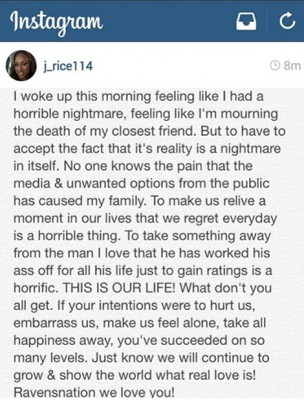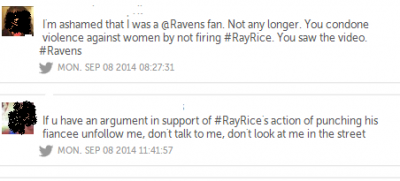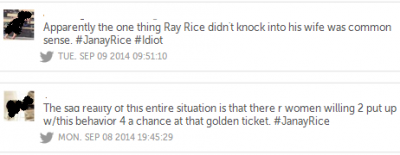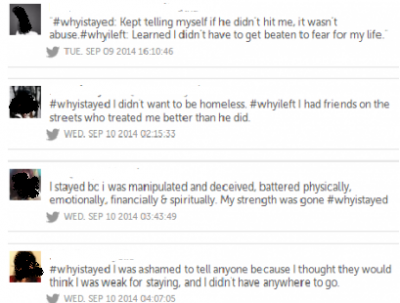The sociologist Kai T. Erikson says that boundaries are made and reinforced on the public scaffold. In the Ray and Janay rice case, Twitter is that public scaffold.
To briefly recap, Ray Rice is a (now former) NFL football player for the Baltimore Ravens. He was originally suspended for two games after part of a video surfaced of his abusive behavior towards his then fiancé, Janay. His suspension from the NFL was made indefinite following TMZ’s release of the entire video[i] in which he punches Janay, and then drags her unconscious body out of a hotel elevator. Though Ray was punished by the NFL, Janay maintained their relationship, marrying him and then releasing a statement in Ray’s defense.
While the public outrage over Ray Rice makes him an object of boundary reinforcement—“violence against women is wrong”—Janay Rice is the object of a boundary war.
Though apologists have a presence—this was especially true in the beginning—Ray Rice has largely been the object of public derision.
As have those who failed to take his offense seriously enough
The reaction to Janay, however, has been far more contentious, as some arduously defend and support her, while others cast her as weak, stupid, and morally culpable.
That is, Janay has become the site of a moral boundary war upon which the moral tenor of Women Who Stay is at stake. The trouble with this boundary war, as fought through Twitter, is that each side, the moral crusaders and moral defenders, cast Janay—as an agentic and empowered subject—aside. That is, they turn Janay into an object through which they exemplify a moral claim. In both cases, it—the moral claim—becomes synonymous with and then subsumes she—the moral subject. Either it/she is complicit in abusive dynamics or it/she is helpless and therefore not culpable. If moral wars are fought on the scaffold, Janay’s is the body displayed prominently in the public square.
But then there’s #whyistayed and #whyileft. These offshoots of the Rice discourse do something qualitatively different than the debates categorized under the encompassing #Janayrice hashtag. Refusing to wage war on and through the object of Janay, women on #whyistayed and #whyileft project their own voices; share their own stories.
The women tweeting on #whyistayed and #whyileft shift the site of battle onto themselves, as active subjects. They put themselves on the public scaffold along with Janay, and shout down to the crowds below.
—————————————————————————————————————————————————————–
[i] I don’t link to the video because I don’t think it’s my place to publicize or watch the traumatic experience of a woman, thereby amplifying her trauma through its public scrutiny.
*Special Thanks to @TonyPLove who learned in 1 day how to mine twitter and conduct sentiment analyses, skills we are using to collaborate on a more formal treatment of the moral boundary debate.
Jenny Davis is an assistant professor of Sociology at James Madison University and a weekly contributor for Cyborgology. Follow Jenny on Twitter @Jenny_L_Davis








Comments 2
Judi — September 19, 2014
#whyistayed I thought I was really in love and got pregnant 3 days after we got married #whyileft he was already having affairs and I was the one supporting us; I definitely decided to get out before it got any worse, I had lived with physical, verbal, mental and sexual abuse all my life growing up from my dad, a person who should have been protecting me; I knew from experience that it would only get worse; besides just having affairs, he was bringing these women into my home while I was at work, having them cook for him and then have sex before they left; that's bad enough in itself, found out from a guy that was his friend that he had several guys out there who were actively procuring women for him on his promise that if they brought him a willing woman, he would then let them have me for whatever their desires were for a night, good thing I didn't know that before he left
Judi — September 19, 2014
just to let you know, I am 5'10" tall and wore a size 8 at the time